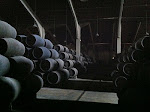Heat Damage
Summer is in full swing here in NYC and we are having a hot one. For the past two weeks it's been in the high 80's to the upper 90's and quite humid. I enjoy this weather, actually. Not for all year round, but for a few high summer weeks I think it's nice. I'm not a fan of air conditioning - much prefer to open windows and use fans to keep air circulating. The kids are used to it, I'm fine with it, everyone is okay.
Except, maybe not everyone.
And still, I suffer from an ailment that afflicts many wine lovers. It is commonly known as wine-under-the-bed syndrome. In some areas of the United States it manifests itself as wine-in-the-closet syndrome. The ill effects of this disease are typically felt in the hottest months, and last week I had a major flare-up.
I should tell you first that I try to contain this problem to the best of my ability. The wines under the bed are almost exclusively meant for near-term drinking. There are, however, some wines that really should be in a temperature controlled environment. I say this because my plan is to age them and drink them years from now, when they mature. Exposure to prolonged heat above 70 degrees is bad for wine. It compromises the sensory experience one can expect from that wine over time. In other words, it is highly likely that a heat-exposed wine will not smell or taste as good as an identical wine that is properly cellared. Here is an interesting piece of writing on this topic, for those of you who want to get academic with it.
The other evening I was rummaging through one of the boxes under the bed and I noticed that a bottle of Riesling I bought with the intention of cellaring had literally blown its top. The top portion of the capsule had been cleanly severed by the cork, which now protrudes from the bottle. It was a separate piece of capsule but the cork pushed it off. This poor wine is the 2011 Schloss Lieser Niederberg Helden Riesling Spätlese. I bought two bottles in the late spring after my umpteenth experience swooning over a mature Riesling and lamenting that I own almost none. Maybe not the most promising vintage for aging, with its plumpness and relatively low acidity, but I drank the basic 2011 Schloss Lieser and it was great, and I know the producer to be top notch. Why not give this well-priced Spätlese a try?
Why these particular bottles showed the effects of the heat and others did not is a mystery to me. I found that both bottles of Schloss Lieser Spätlese were obviously damaged. The one in the photo is the result of excess pressure generated inside the bottle by the heat, I'm guessing. The other one had sticky seepage coming from under the capsule (but I drank it and the wine was delicious). The same producer's 2011 Kabinett - no signs of damage. The bottles of Weiser-Künstler Spätlese and Kabinett in the very same wine box...no problems that I can detect.
So, I looked through the rest of the under-the-bed boxes and found that there are a few bottles whose corks look to be in the opposite state - they seem as though they've been pushed down into the bottle a little bit. Not all of the wines, only a few. But sadly, they include wines that I care about and had hoped to age.
This one is the 2010 Stony Hill Chardonnay. I bought two bottles at the winery and was very much looking forward to drinking them in 10 years or so. Both have corks that feel pushed down. I imagine it would be safer to drink them soon. The other hurt bottles are the 2010 Pépière Granite de Clisson, and again, it's all of them that have the weirdly depressed corks. There must be something about those particular wines (or those corks?). The only other under-the-bed wine that I meant to cellar is the 2011 Gonon Saint-Joseph and it seems completely fine, with free spinning capsules and a normal feel to the cork and the lip of the bottle. But it also seems rational to assume that those wines have been compromised by the same heat that hurt their under-the-bed neighbors. I'll probably keep them and try one in 10 years. If it's no good, I'll serve the others to Richard Nixon while my other guests drink my properly cellared 2010's.
There is a lesson in here somewhere, but not one that I'm willing to accept. Keep less wine in the house - I'd like to but doesn't seem possible. Or, keep the air conditioner on when the temperature rises above 70 degrees - simply not going to happen. Learn to love my great and age-worthy Syrah and Chardonnay while its really young - seems like a waste. Pay a hefty fee every year for offsite storage, and annoying inventory and delivery fees every time I put in or take out wine - already doing it with a pal, but maybe I should invest more in this, and get rid of one of the fridges too. Win the lottery so I can buy a house with a basement and build a real wine cellar - I will start buying tickets immediately.
This is why so many of us continue to suffer from this painful and destructive condition. There are treatments that can offer some momentary relief, but there is no real cure.











8 comments:
Thanks for mentioning my post on The Academic Wino! I'm going to add you to my blog roll right now!
Cheers!
I personally find wines with residual sugar to be more likely candidates for leaking.
I do have the same problem with storage/buying too many wines, esp. those to age. (I buy/drink a ton of savagnin so I always hope those will survive but then i tend to treasure the the most.) Am up to 4 small wine refrigerators packed to the gills but the way you store your bottles without racks is giving me an idea, LOL...
Which wine refrigerators are the best? I bought a used eurocave and it seems to be holding up, but like you I have quickly filled it and have a couple cases at home that really need a proper home.
A bit off topic perhaps but some years ago I forgot a few bottles of wine in non temp controlled space for the time of my vacation and it just happened to become the hottest two weeks of that year. Almost all wines were cooked to the point of being undrinkable except for the one bottle of Chave St. Joseph that ended up tasting, while perhaps a bit advanced, amazingly good.
So I guess it is a better bet to leave your N. Rhône Syrahs under the bed instead of something else? :)
There's no way around it, sadly. This past year I drank a bottle of 1990 Chateau Margaux that a buddy kept in his NYC apt's over the past 20 years. Needless to say, he was crestfallen to discover that the wine had suffered tremendously. All the length & sapidity were gone. His mother has an identical bottle that's spent those 20 years in proper storage. It'll be interesting to hear how different that turns out to be.
Painful though it may be to pony up for the storage space, this is your passion & you know how meaningful it can be to discover a wine in its maturity. That's all the more meaningful when you pull it out of your own cellar (or retrieve it from storage) & savor not only the wine but also the memory of its purchase & that time in your life & the impulse that spurred you to buy it (a visit, a friend, a whim).
Viewed that way, it's an investment not just in your wine, but also in your memory. Not a bad use of your resources, all things considered.
Good luck!
Sounds like a good chance of secondary bottle fermentation with those two blown corks. Curious if you get some spritz when you open them?
Post a Comment